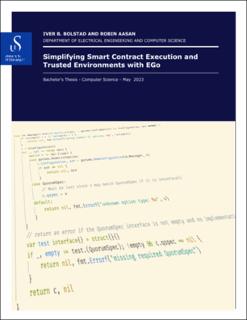| dc.contributor.advisor | Jehl, Leander | |
| dc.contributor.author | Bolstad, Iver Bye | |
| dc.contributor.author | Aasan, Robin | |
| dc.date.accessioned | 2023-07-05T15:51:37Z | |
| dc.date.available | 2023-07-05T15:51:37Z | |
| dc.date.issued | 2023 | |
| dc.identifier | no.uis:inspera:130505068:68750255 | |
| dc.identifier.uri | https://hdl.handle.net/11250/3076136 | |
| dc.description.abstract | IoT has had significant growth during this last decade. However, its adoption on the edge isn’t obviously feasible as it poses risks concerning data privacy, integrity and accountability. This is particularly true in situations involving multiple competitive stakeholders or when deploying devices in remote areas without proper surveillance as data manipulation by intruders may occur. Trusted Execution Environments (TEEs) have the advantage of isolating sensitive operations by separating themselves from the host operating system, ensuring confidentiality and privacy. Together with blockchain technology, TEEs can help establish trust between stakeholders. ChainBox is one such framework that enables trusted computing on the edge by utilizing TEEs and blockchain. Furthermore, ChainBox incorporates the use of WebAssembly for executing smart contracts providing additional isolation. However, Chainbox has a complex programming model. Thus, this thesis aims to evaluate and examine a framework called EGo that provides a straightforward programming model for developing Trusted Execution Environments (TEEs). Accomplishing this is done through reimplementing ChainBox, leveraging the capabilities of the EGo.
We show that EGo is a user-friendly and straightforward framework, most relevant for developers with limited experience with more advanced SDKs such as the Intel SGX SDK. With our reimplementation of ChainBox, using simplified smart contracts and non-secure connections, EGo performs with a throughput of about 3 to 3.5 times worse than the standard Go compiler. | |
| dc.description.abstract | IoT has had significant growth during this last decade. However, its adoption on the edge isn’t obviously feasible as it poses risks concerning data privacy, integrity and accountability. This is particularly true in situations involving multiple competitive stakeholders or when deploying devices in remote areas without proper surveillance as data manipulation by intruders may occur. Trusted Execution Environments (TEEs) have the advantage of isolating sensitive operations by separating themselves from the host operating system, ensuring confidentiality and privacy. Together with blockchain technology, TEEs can help establish trust between stakeholders. ChainBox is one such framework that enables trusted computing on the edge by utilizing TEEs and blockchain. Furthermore, ChainBox incorporates the use of WebAssembly for executing smart contracts providing additional isolation. However, Chainbox has a complex programming model. Thus, this thesis aims to evaluate and examine a framework called EGo that provides a straightforward programming model for developing Trusted Execution Environments (TEEs). Accomplishing this is done through reimplementing ChainBox, leveraging the capabilities of the EGo.
We show that EGo is a user-friendly and straightforward framework, most relevant for developers with limited experience with more advanced SDKs such as the Intel SGX SDK. With our reimplementation of ChainBox, using simplified smart contracts and non-secure connections, EGo performs with a throughput of about 3 to 3.5 times worse than the standard Go compiler. | |
| dc.language | eng | |
| dc.publisher | uis | |
| dc.title | Simplifying Smart Contract Execution and Trusted Environments with EGo | |
| dc.type | Bachelor thesis | |
